



Goose Parvovirus
An overview of this disease from the UK Veterinary Laboratories Agency.Goose parvovirus (GPV) infection (also known as Derzsy's disease, goose hepatitis, infectious myocarditis or goose/gosling plague) is a contagious disease of goslings and Muscovy ducklings only.
Geographical distribution
The disease has been reported from all major goose farming countries in Europe (includes Hungary, Poland, France, Germany and Denmark), and the former Soviet Union, Israel, China, Viet Nam and Japan.

Clinical signs
There may be a necrotic lining to the inside of the mouth and surface of the tongue (oropharyngeal and lingual diphtheresis and pseudomembrane formation). Affected birds may regurgitate food/water and body feathers may be wet and stained.
Other signs include head shaking, anorexia and weakness, oculo-nasal discharge and crusting, often with the eyelids sticking together, and in slightly older birds, diarrhoea with vent staining.
The disease is strictly age-dependent with up to 100 per cent mortality in goslings less than seven days old and negligible losses by four to six weeks of age. The severity of disease in neonatal birds will depend on levels of maternally derived antibody. Stunting and poor feathering may be seen in survivors.
Transmission
Infected birds excrete large amounts of virus in their faeces resulting in a rapid spread of infection by direct and indirect contact. Antibodies may persist for several years. Older geese can become sub-clinically infected and a latent infection established. Such birds can act as carriers and transmit the virus through their eggs resulting in infertility and hatchability problems and the transmission of infection to other goslings at hatching.
In common with other parvoviruses, GPV is very resistant to chemical and physical inactivation.
There is no known public health significance, and GPV is not a notifiable disease in birds. No biological vectors have been identified.
Treatment and control
There is no specific treatment. Antibiotics may reduce losses from secondary bacterial infections.
Control relies upon good biosecurity, hygiene and eliminating carrier birds. If a GPV outbreak occurs, it is not advisable to retain recovered or in-contact goslings for breeding, as the birds are potential carriers of the virus and may transmit GPV via their eggs. Suspect carriers should be reared away from other geese and Muscovy ducks.
On breeding units, only eggs from known GPV-free flocks should be incubated together and good hatchery hygiene should be maintained.
In the event of an outbreak, in-contact breeding geese that have not been GPV-vaccinated can be monitored serologically for infection. Consideration should then be given to culling sero-positive birds.
Further Reading
| - | Find out more information on goose parvovirus by clicking here. |
December 2009








